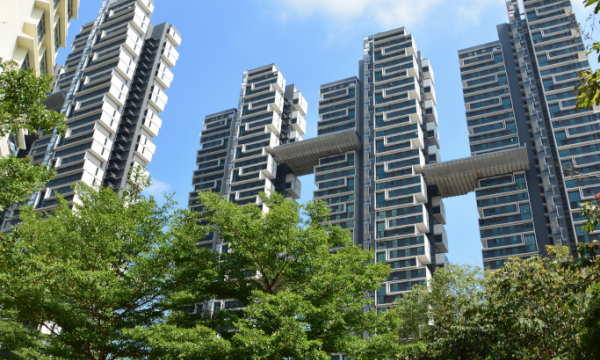
Residential property prices rise in Q3 as investors reposition assets
Long-term investors, wealthy buyers may be looking at properties amidst flight from riskier assets.
Prices of landed and non-landed properties registered increased in the third quarter as consumer confidence steadily returned with the gradual reopening of the economy.
Landed property prices rose 3.7% in Q3 after remaining unchanged in the previous quarter, according to the latest data released by the Urban Redevelopment Authority (URA). Non-landed property prices also rose by 0.1% during the same quarter to extended the 0.4% increase in Q2.
Analysed per region, core central region (CCR) non-landed property prices registered a 3.8% decline whilst prices in the rest of central region (RCR) and outside central region (OCR) jumped by 2.5% and 1.7%, respectively.
This is a sign of consumer confidence returning as many economic sectors begin to reopen, according to Christine Sun, head of research & consultancy, OrangeTee & Tie.
Many long-term investors and wealthy buyers are also on the prowl for real estate properties as they repositioning their wealth from riskier assets in light of the macroeconomic uncertainties, she added.
“Investors were scouring for gems in the market whilst owner-occupiers were snapping up ‘star-buy’ units released by property developers,” Sun noted.
Rentals of private residential properties fell by 0.5% in Q3, slowing from the 1.2% decrease in Q2. Rentals of landed properties dipped by 0.1% during the quarter whilst rentals of non-landed properties dropped by 0.6%.
The pandemic and rising unemployment amongst foreign workers stalled rental price growth, Sun said. This was further exacerbated by many global economies still reeling from the pandemic, coupled with strict border controls and an uncertain employment climate.
Analysed per region, rentals of landed and non-landed property space in CCR recorded declines whilst those in the RCR and OCR increased. Landed and non-landed property rentals of in CCR decreased by 0.1% and 2.1%, respectively.
Meanwhile, landed and non-landed rentals in RCR increased by 0.3% both, whilst landed and non-landed rentals in OCR edged up by 1%, respectively.
Sun observed a rise in the number of Singaporeans renting homes, which may be driven by the work from home set-up that many companies had to implement due to social distancing measures.
“There seem to be more Singaporeans renting homes recently. Some prefer the privacy and convenience of living apart from their families, especially with more people working from home,” she said.
“A growing number of tenants have been opting for shorter leases as many have the intention of moving elsewhere if they manage to find cheaper accommodation. As leases are now shorter, there will be more transactions recorded over time,” Sun added.
Resale transactions accounted for 49.2% of all sales transactions in Q3, up from 35% in Q2. There were a total of 3,467 resale transactions during the quarter, compared with the 933 units transacted in the previous quarter.
Looking forward, there was a total supply of 50,369 uncompleted private residential units (excluding ECs) in the pipeline with planning approvals. Of this number, 26,483 units remained unsold as at the end of the quarter, compared with the 27,977 units in the previous quarter. Accounting for the 4,104 ECs units in the pipeline, there were 54,473 units in the pipeline with planning approvals.
Apart from the 28,727 unsold units (including ECs) with planning approval, there is a potential supply of around 3,100 units (including ECs) from Government Land Sales (GLS) sites that have not been granted planning approval yet.
Meanwhile, the stock of completed private residential units (excluding ECs) increased by 404 units in Q3, compared with the decrease of 173 units in the previous quarter. The stock of occupied private residential units (excluding ECs) decreased by 2,605 units.
As a result, the vacancy rate of completed private residential units (excluding ECs) increased to 6.2% as at the end of Q3, from 5.4% in the previous quarter.
Looking ahead, Sun expects to see stronger real estate activity in Q4 compared to previous years, which could help to mitigate the adverse impact from the new regulations imposed on the reissuing of options to purchase (OTPs).
“As most locals will remain in Singapore due to the global travel restrictions, some may spend their holidays visiting show flats or attending virtual home tours,” she noted.
The restriction on the reissue of OTPs is unlikely to put a significant dent on home prices, according to Sun, who estimates that around 2000 to 2,500 new homes could be sold in the final quarter of this year, for a total of 8,500 to 9,500 new homes sold in 2020.
























 Advertise
Advertise









